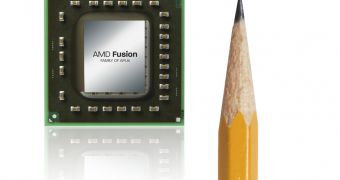Expected to arrive in the first quarter of 2012, AMD's Wichita accelerated processing units for netbooks, low-cost notebooks and other low-power devices seem now to have been delayed as the chip maker is having trouble finding a foundry ready to mass produce its 28nm APUs.
This information was provided by a source with knowledge of AMD's plans that was cited by the Xbit Labs publication.
According to the same source, the Sunnyvale-based company still hasn't set an exact schedule for the launch of Wichita and it now intends to sell first-generation Fusion chips, code named Brazos, until Q4 of 2012.
AMD's Wichita accelerated processing units will use an advanced chip design as the company plans for it to become the first quad-core x86 system-on-a-chip (SoC) solution.
This means that outside of the four computing cores, Wichita will also include a built-in graphics core as well as the I/O functionality usually found in the FCH controller.
The chip will get support for dynamic overclocking through the Turbo Core 3.0 technology, DirectX 11 compatible graphics, a DDR3 memory controller and the Yuba FCH (Fusion controller hub), which supports Serial ATA, PCI Express, USB and other I/O protocols.
Wichita will use the FT2 BGA packaging and makes part of the Deccan platform for netbooks, low-cost and ultra-thin notebooks and nettops.
Thanks to the quad-core design, the APU is expected to deliver significantly higher performance than Ontario and Zacate, without exceeding the thermal power envelope of its predecessors, while the dual-core version of the chip will significantly reduce power consumption when compared to AMD's current solutions.
Thanks to the high integration achieved, AMD will also enable OEMs and ODMs to decrease the cost of the devices built around these APUs. AMD is expected to keep the price of Wichita under $100 US (73 Euros).
As mentioned above, AMD designed Wichita to be fabricated using the 28nm production process, but, at this time, is still uncertain whether this will be manufactured by Globalfoundries or TSMC. Both of these foundries seem to have troubles with mass producing 28nm chips.
Apart from the obvious manufacturing issues, Wichita's delay could be also motivated by AMD's plans to introduce the high-performance Trinity APU in the first quarter of 2012.

 14 DAY TRIAL //
14 DAY TRIAL //